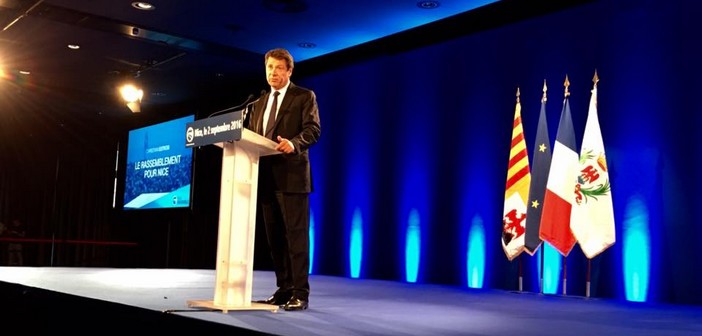The traditional end-of-summer political fair of Christian Estrosi’s friends, now active under the banner “Rally for Nice,” which was usually held in the enchanting setting of Castle Hill in a friendly atmosphere, had to make way for a more conventional meeting in one of the salons of the Acropolis Palace.
“This summer, there was no carefreeness, no lightness, or so little. Because this summer is not like any other. Since this summer, war is here,” explained the leader, speaking after his lieutenants Pierre-Paul Leonelli (President of the majority group at the Regional Council) and Philippe Pradal (his successor at the Nice City Hall), Rudy Salles (from the UDI but among the most loyal), Renaud Musellier (his right-hand man at the head of the Region) and Eric Ciotti (the friend-rival, currently more friend than rival, with whom he campaigns in the Sarkozy team for the climb to power).
The cohort of activists and supporters had come to listen to a strong speech, and they were not disappointed.
Since we are at war, the president of the Region and the Metropolis (who always has a hand on Nice in a duo with Philippe Pradal and an eye on parliamentary life through the youngest, Marine Brenier, despite his resignation from these two mandates) perfectly played the role of “commander of struggles.”
In his address, in a (sociologically) “Trumpist” atmosphere (those present were almost all white people with an average age over 50), Christian Estrosi revisited the July 14th attack: “What I experienced profoundly changed me,” was his public confession to point out and denounce the faults and responsibilities of the State, particularly his nemesis, Prefect Adolphe Colrat.
We will not revisit the various grievances that formed a real and proper indictment, as they have already been the subject of public statements on many occasions. Besides, the ongoing judicial investigation will address them, following the timelines and modalities appropriate to justice and respectful of a rule of law.
Regarding the more political aspect (“Today’s battle and tomorrow’s perspectives,” namely the Les Républicains primary in November and the Presidential election in May 2017), the “basileus” of the right in the department (he is the party president in the Alpes-Maritimes) reiterated, as Eric Ciotti had done before him, the most significant points of Nicolas Sarkozy’s program, to the construction of which “I have contributed my experience,” he claimed, thereby indicating that his support for the latter’s candidacy was not a last-minute decision. Quite the contrary,
The central axis, beyond the contents found in the book “All for France” and which will undoubtedly be the subject of many internal debates between the LR candidates for the supreme nomination in the coming weeks, revolves around the triptych “a strong, present, embodied State.”
The message is clear: “That man is Nicolas Sarkozy,” he asserted with conviction and an authoritative tone, the one who hasn’t abandoned the ambition to play a national role.
The authoritarian and vertical model, which reflects the personality and style of the former President of the Republic, is inspired by what political analysts call “democrature,” a mix of leadership and authoritarianism, with well-known examples closer to us being Vladimir Putin and Benjamin Netanyahu (who are, not coincidentally, in excellent relations with him and will certainly be so in case of a return to power).
To end and return to “Nice, which brings us together in pain as in joy,” Christian Estrosi launches two master words: Hope and recovery.
We gladly leave him the grand finale with the poetic flourish “Nice will always be stronger, Nice will always be more beautiful. Nice of our heart, forever!”


